Contents
What is Mental Development?
Develop yourself mentally and engaging in the process of mental development enables the enhancement of your cognitive faculties and the expansion of your thought patterns. This transformative journey gives rise to a potent and dynamic mindset, effectively birthing an evolved iteration of your being.
It is akin to unearthing a fresh, unexplored version of your true potential, unlocking the depths of your inner capabilities. As you embark on this quest, the impeding barriers that obstruct your path gradually dissipate, allowing you to transcend limitations and surmount adversities. The imperative of nurturing and cultivating your mental faculties through the art of mental development cannot be overstated.
You can prefer this mental development book.
How to Develop Yourself Mentally?
There are some ways to develop yourself mentally, some of those are as given below:
• Meditation.
• Never lose your confidence.
• Throw your fear away.
• Never give up.
1. Meditation

Meditation traces its roots back to the ancient Vedic tradition in India, dating over three millennia. Serving as a profound exercise for the mind, meditation encompasses various practices aimed at cultivating mental prowess.
It entails the art of focused concentration, utilizing any of the five senses as a gateway to delve deep within oneself. In essence, meditation can be likened to a transformative software update for the mind, allowing for heightened awareness and inner rejuvenation through the power of sustained focus.
Benefits of Meditation
Through the practice of meditation, the intricate development of the mind unfolds. This transformative process engenders a state of simultaneous relaxation within the realms of both the mind and body. As you embark on this profound journey, a profound sense of comfort permeates your being, gently cradling your consciousness.
Meditation acts as a conduit for fostering positive and uplifting thoughts, thereby nurturing the blossoming of an enhanced memory capacity. Furthermore, it serves as a catalyst for boosting your confidence, thereby fortifying your mental development and fostering a profound sense of self-growth.
How to do Meditation in an Easy Way?
Meditation offers a gateway to inner peace and tranquility. If you’re seeking an easy and accessible way to begin your meditation practice, this stepwise guide will help you embark on your journey of mindfulness with simplicity and ease.
Step 1: Find a Quiet Space: Choose a serene and quiet space where you can comfortably engage in meditation. It could be a peaceful corner of your home, a serene park, or any place that allows you to disconnect from external distractions.
Step 2: Get Comfortable: Assume a relaxed and comfortable seated position. You can sit on a cushion, a chair, or even cross-legged on the floor—whichever position feels most natural and supportive for your body.
Step 3: Relax Your Body: Close your eyes gently and take a moment to relax your body. Release any tension you may be holding in your muscles. Allow your body to settle into a state of ease and stillness.
Step 4: Focus on Your Breath: Shift your attention to your breath. Observe the natural flow of your breath as it enters and exits your body. You can place your hands on your abdomen to feel the gentle rise and fall with each breath.
Step 5: Be Present with Your Thoughts: As you continue to focus on your breath, thoughts may arise in your mind. Instead of getting caught up in them, simply observe them without judgment. Allow them to come and go, gently bringing your attention back to your breath.
Step 6: Engage in Guided Meditation (Optional): If you prefer guidance, consider using a guided meditation recording or app. These resources provide step-by-step instructions and soothing prompts to assist you in your practice.
Step 7: Set a Timer: To ensure you have dedicated time for meditation, set a timer for your desired duration. Start with shorter sessions, such as 5 or 10 minutes, and gradually increase the duration as you become more comfortable with the practice.
Step 8: Cultivate Mindful Awareness: Throughout your meditation, aim to cultivate a sense of mindful awareness. Embrace the present moment fully, allowing yourself to be fully immersed in the sensations of your breath and the stillness around you.
Step 9: Conclude with Gratitude: As your meditation session comes to an end, take a moment to express gratitude for this time of self-care and inner connection. Gently bring your awareness back to your surroundings before opening your eyes.
2. Never Lose Your Confidence

Developing yourself mentally necessitates the cultivation of confidence, an invaluable attribute. Confidence serves as a catalyst for greatness, propelling us to achieve remarkable feats and elevate our personal growth to unprecedented heights. If our aim is to embark on a journey of mental development, fostering and amplifying our confidence becomes paramount. While possessing a strong foundation of confidence is advantageous, those who lack it can actively engage in practices to enhance and nurture this vital attribute.
The quest to develop oneself mentally is intrinsically intertwined with the pursuit of bolstering confidence, enabling us to unlock our true potential and embrace a transformative path of self-discovery and growth.
How To Boost Confidence Level?
- Acknowledge Your Achievements: Take a moment to recognize and appreciate the accomplishments you have already attained. Reflect on the progress you’ve made, no matter how small or insignificant it may seem. Celebrate these achievements as stepping stones towards further growth.
- Identify Your Inner Skills: Discover the unique talents and strengths that reside within you. Each individual possesses inherent abilities and areas of expertise. Explore these inner skills and nurture them through dedicated practice and learning.
- Set Daily Goals: Establish specific and attainable goals for each day. By breaking down larger aspirations into smaller, manageable tasks, you create a sense of accomplishment as you successfully achieve them. This habit fosters a positive mindset and reinforces a pattern of continuous growth.
- Engage in Mirror Talk: Utilize the power of self-talk by standing in front of a mirror and engaging in positive affirmations or practicing skills you wish to develop. For instance, if you aim to improve your English speaking abilities, converse with yourself in English, allowing the mirror to serve as a supportive audience. This exercise not only enhances your talents but also bolsters your confidence.
- Embrace Exercise: Incorporate regular physical exercise into your routine as a means to elevate your confidence. Engaging in physical activity releases endorphins, boosts self-esteem, and instills a sense of accomplishment. Choose activities that you enjoy and make exercise a pleasurable part of your daily life. Do Exercise. Exercise is the best process to boost your confidence level.
By implementing these points into your routine, you can embark on a journey of self-discovery, harness your inner potential, and cultivate unwavering confidence along the path of personal development.
3. Throw Your Fear Away
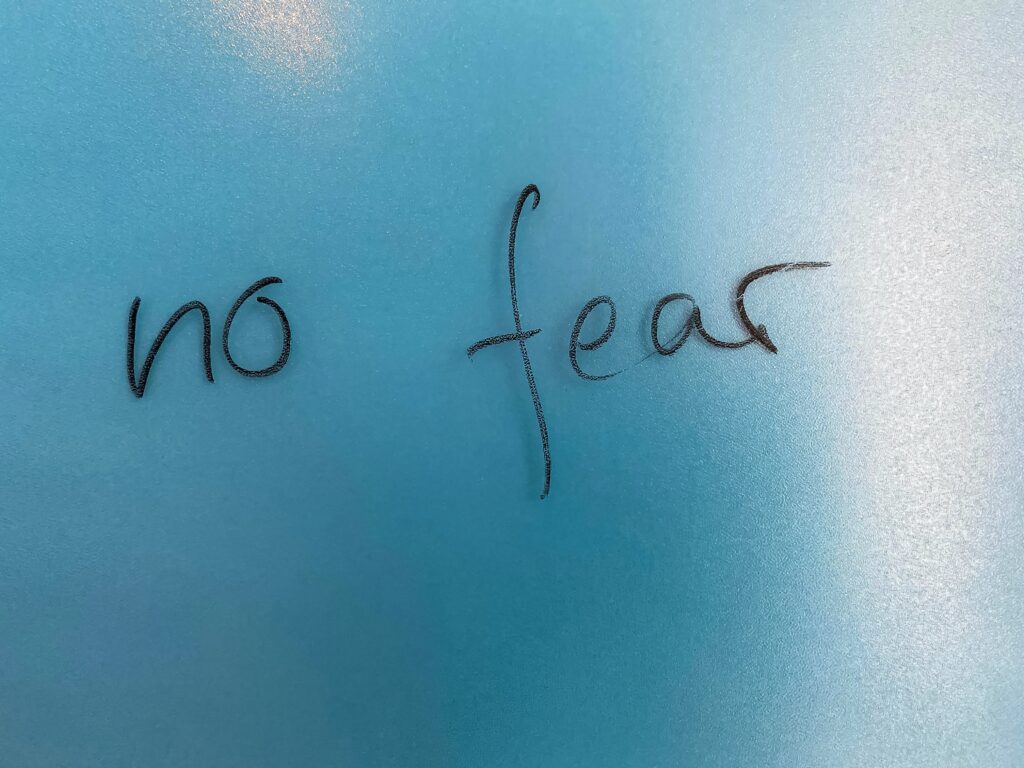
Casting aside fear is a transformative endeavor that yields immense benefits, particularly in the realm of confidence building. By liberating ourselves from the shackles of fear, we unlock the boundless potential to accomplish extraordinary feats.
As fear dissipates, we embrace a newfound fearlessness that emboldens us to venture into uncharted territories, seize opportunities, and take calculated risks in pursuit of our desired future endeavors. Liberated from the grip of fear, our path to mental development becomes effortless, as we navigate the realms of personal growth with unwavering determination and resilience.
Below are some of the best ways to throw your fear away from you:
- Acknowledge and Identify Your Fears: Begin by recognizing and acknowledging the fears that hold you back. Take the time to understand their origins and how they impact your life. This self-awareness is the first step towards overcoming them.
- Challenge Negative Thoughts: Combat fear-inducing thoughts by questioning their validity. Challenge negative beliefs and replace them with positive, empowering affirmations. Reframe your mindset to focus on possibilities rather than limitations.
- Embrace Courageous Actions: Face your fears head-on by taking small steps outside of your comfort zone. Each act of courage builds resilience and diminishes the power of fear. Start with manageable challenges and gradually progress to more significant ones.
- Seek Support: Don’t hesitate to reach out to support individuals in your life. Share your fears and concerns with trusted friends, family members, or a mentor who can provide guidance and encouragement along your journey.
- Practice Mindfulness and Visualization: Engage in mindfulness techniques to cultivate a sense of calm and centeredness. Visualization exercises can help you imagine yourself confidently conquering your fears. Visualize success and immerse yourself in the positive emotions associated with
- Learn from Failure: Recognize that failure is a natural part of growth and should not be feared. Embrace failures as learning opportunities, extracting valuable lessons that propel you forward. Each setback brings you closer to resilience and eventual success.
- Celebrate Your Progress: Acknowledge and celebrate every milestone you achieve in conquering your fears. Reward yourself for the steps you take, no matter how small. Cultivating a positive mindset reinforces your ability to overcome fear and bolsters your self-confidence.
By embracing these best practices, you can gradually release the grip of fear and pave the way for personal growth, self-assurance, and mental development.
4. Never Give Up

In the pursuit of mental development, one crucial lesson to embrace is the art of resilience and the refusal to succumb to defeat. Countless individuals in this world falter in their endeavors, readily surrendering at the first sign of adversity. Irrespective of the simplicity or complexity of a task, the propensity to give up easily stifles their mental growth.
Those who truly thrive in their journey of self-improvement understand the significance of persevering through challenges. They possess an unwavering determination that fuels their progress, enabling them to navigate obstacles with tenacity and evolve mentally. By embodying the spirit of unwavering persistence, one lays the foundation for transformative personal growth and unlocks the boundless potential that lies within.
How to Learn to Never Give Up?
Never give up! https://t.co/koR9fwPFih #MotivationalQuotes #learning pic.twitter.com/GOXowbzSt8
— Memrise (@memrise) January 21, 2017
- Embrace a Growth Mindset: Adopt a mindset that views failures and setbacks as opportunities for growth. Believe that your abilities and intelligence can be developed through effort and learning. Embrace challenges as stepping stones toward personal development.
- Set Clear and Realistic Goals: Define clear and achievable goals that align with your aspirations. Break them down into smaller, manageable steps to maintain motivation and track progress. Each small milestone achieved reinforces your determination and builds momentum.
- Develop Inner Motivation: Discover your inner drive and passion for what you’re pursuing. Cultivate a deep-rooted sense of purpose that fuels your commitment to your goals. When motivation wavers, reconnect with your “why” to rekindle your resolve.
- Cultivate Resilience: View setbacks as temporary and solvable. Learn from failures and use them as opportunities for growth. Develop coping mechanisms and positive self-talk to bounce back from disappointments and maintain focus.
- Seek Support and Learn from Others: Surround yourself with a supportive network of mentors, friends, or like-minded individuals who inspire and motivate you. Learn from their experiences and wisdom. Draw upon their encouragement during challenging times.
- Practice Perseverance: Persist through difficult times, even when the path seems daunting. Break down tasks into smaller, manageable steps, and tackle them one at a time. Stay committed and disciplined, knowing that each effort brings you closer to your goals.
- Cultivate Optimism: Adopt an optimistic outlook, focusing on possibilities and solutions rather than dwelling on limitations. Train your mind to see setbacks as temporary roadblocks, fueling your determination to find alternative routes.
- Celebrate Progress: Acknowledge and celebrate your achievements, no matter how small. Recognize the progress you’ve made along your journey. Embracing the positive reinforces your resilience and strengthens your ability to stay committed.
- Learn from Setbacks: View setbacks as valuable lessons. Analyze what went wrong and identify areas for improvement. Adapt your strategies and approach, armed with newfound knowledge and insights gained from your experiences.
- Practice Self-Care: Nurture your mental and emotional well-being through self-care practices. Prioritize rest, relaxation, and activities that rejuvenate you. Taking care of yourself physically and mentally enhances your ability to stay focused and resilient.
By embracing these practices, you can cultivate the mindset of never giving up. Remember, resilience is a skill that can be developed with practice. Stay committed to your goals, believe in your abilities, and let the journey of personal growth unfold, even in the face of adversity.
What is a Mental disability?
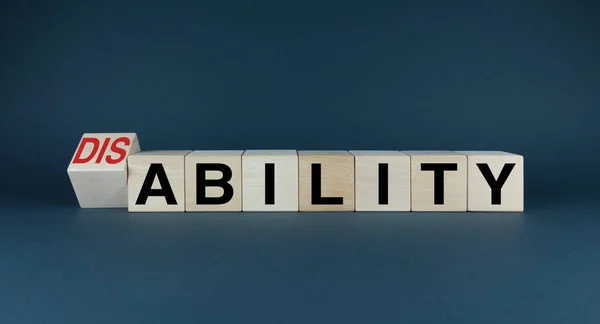
Ladies and gentlemen, in simpler terms, a prolonged condition that significantly impacts an individual’s well-being can be classified as a mental disability. Life presents us with countless experiences that may leave us feeling perplexed or out of place. While it is true that such circumstances can make it challenging for a person to maintain control, it is crucial for them to cultivate inner strength and mental fortitude during those times.
Now, my friends, if you have been following this blog post from the beginning, I am confident that you have gained valuable insights into the realms of mental development and personal growth. However, let us delve a little deeper into the topic of mental disabilities. Are you ready? Let’s embark on this enlightening exploration together!
7 Types Of Mental Disorders
1. Anxiety Disorders
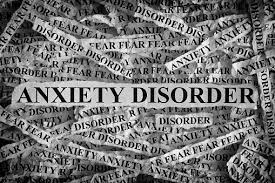
Dear friends, as you encounter the term “Anxiety Disorder,” you may begin to grasp its essence. Anxiety disorders stand as the most prevalent mental health challenges faced by individuals. As mentioned earlier, everyone experiences moments in life where they find themselves in a state of unease.
Similarly, many individuals grapple with intense stress and anxiety, reaching a point where they feel overwhelmed and incapable of managing their circumstances. While each anxiety disorder may manifest differently, they share a common thread—excessive worry that permeates thoughts, emotions, and physical sensations. These concerns significantly impact a person’s life for a duration of at least six months.
As you read this blog post, there are likely individuals in your immediate surroundings who find themselves ensnared in this struggle. For instance, I have a friend who becomes greatly agitated when caught in traffic, causing considerable distress. Furthermore, he constantly frets about others’ perceptions of him, exacerbating his feelings of unease. Friends, it is my hope that this explanation has provided you with a deeper understanding of anxiety disorders.
2. Mood Disorder
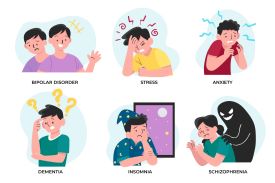
Dear friends, it is important to acknowledge that our moods are subject to fluctuations over time. Nonetheless, I sincerely hope that your mood remains predominantly positive and that happiness permeates your being. Now, let me simplify the concept of mood disorders for you.
Mood disorders encompass disruptions in an individual’s emotional state or behavioral patterns, leading to undesirable changes that can adversely affect their well-being. These alterations in mood can be classified as mood disorders when they hinder one’s ability to function optimally. Numerous factors can contribute to the development of mood disorders.
There are a total of 5 classifications of mood disorders.
- Manic Episode.
- Depressive Episode.
- Bipolar Mood Disorder.
- Recurrent Depressive Disorder.
- Persistent Mood Disorder (Dysthymia).
3. Psychotic Disorders

Dear friends, I have a question for you. Are you familiar with the term “psychotic disorders” and the concept of psychosis? Understanding these terms can greatly aid in early recognition of the disorder and facilitate appropriate treatment. Individuals experiencing psychotic disorders find it challenging to maintain a firm grasp of reality for prolonged periods. They may also exhibit heightened irritability, which can be perplexing for those around them.
Psychotic disorders present unique difficulties, as they can impair an individual’s ability to think clearly and make sound judgments. This condition can be quite perplexing for those affected, as their thoughts may become distorted, leading to confusion and potential challenges in decision-making.
4. Eating Disorders

Dear friends, the desire to escape hunger is universal. However, for many individuals, controlling this instinct becomes immensely challenging. Consequently, they may find themselves consuming excessive amounts of food, struggling to maintain a balanced diet, and subsequently facing difficulties in managing their weight. This pattern of behavior is commonly referred to as an Eating Disorder, which can evoke feelings of sadness and distress.
Nevertheless, my friends, we must remember that in life, we should never lose hope, for there is always a solution to every problem. There exist numerous approaches to address and overcome eating disorders. With perseverance and dedicated effort, you can embark on a journey of physical self-development, actively working towards attaining a healthier relationship with food and your body.
5. Personality Disorders

Dear friends, in our world, it is unfortunate that many individuals resort to judging others based on their personalities. The significance of possessing the right personality cannot be undermined in our journey through life. Consequently, many individuals invest considerable effort into developing and refining their personalities.
However, it is crucial to acknowledge that Personality Disorder represents a mental health condition. This disorder manifests in distinct variations in an individual’s thinking patterns, behavior, and overall functioning. Such deviations from the norm can pose unique challenges for those affected.
6. Dementia

Dementia refers to a cluster of symptoms encompassing challenges with memory, thinking, problem solving, language, and perception. These symptoms significantly impact an individual’s daily life, interfering with their ability to function effectively. It is essential to understand that dementia is not a standalone disease and should not be considered a natural consequence of aging.
The underlying cause of dementia lies in the loss of nerve cells. As a progressive condition, the symptoms worsen gradually over time. Unfortunately, once a nerve cell perishes, it is typically not regenerated or replaced, contributing to the progression of the condition.
7. Autism

As per the Centers for Disease Control and Prevention, Autism Spectrum Disorder (ASD) impacts approximately 1 in 54 children in the United States. ASD, also known as Autism, is a neurodevelopmental disorder that primarily affects an individual’s social and communication skills. Individuals with ASD may also exhibit particular strengths and areas of intense interest, alongside tendencies toward repetitive behaviors and sensory sensitivities.
It is noteworthy that Autism is occasionally associated with notable aptitudes in domains such as visual memory, music, art, mathematics, and science. However, it is crucial to recognize that each person with ASD is unique, with their own distinctive set of strengths and challenges.
Conclusion
The paramount message to take away from this post is the imperative of continuous mental development. By nurturing your mental growth, you simultaneously enhance various skills essential for personal and professional advancement. These skills encompass effective communication, critical thinking, and numerous others. As you invest in the development of these skills, you pave the way for progress in your business and all facets of life. Embrace the journey of mental development and unlock the boundless potential within you.
FAQs (Frequently Asked Questions)
What Is The Meaning Of Mental Development?
According to me, mental development means that you improve your skills through some process. For example; you can develop your mind through meditation and if your mind develops your way of thinking can also develop.
Why Is Mental Growth Important?
Human beings need growth in life and this growth is not achieved directly, we have to develop ourselves mentally for this. I mean, you need to develop mentally for achieving success.
What Is Considered a Mental Disability?
Psychiatric disabilities cover a wide range of conditions, including eating disorders, post-traumatic stress disorder, anxiety disorders, depression, and other psychiatric conditions. Psychiatric disabilities are very common.
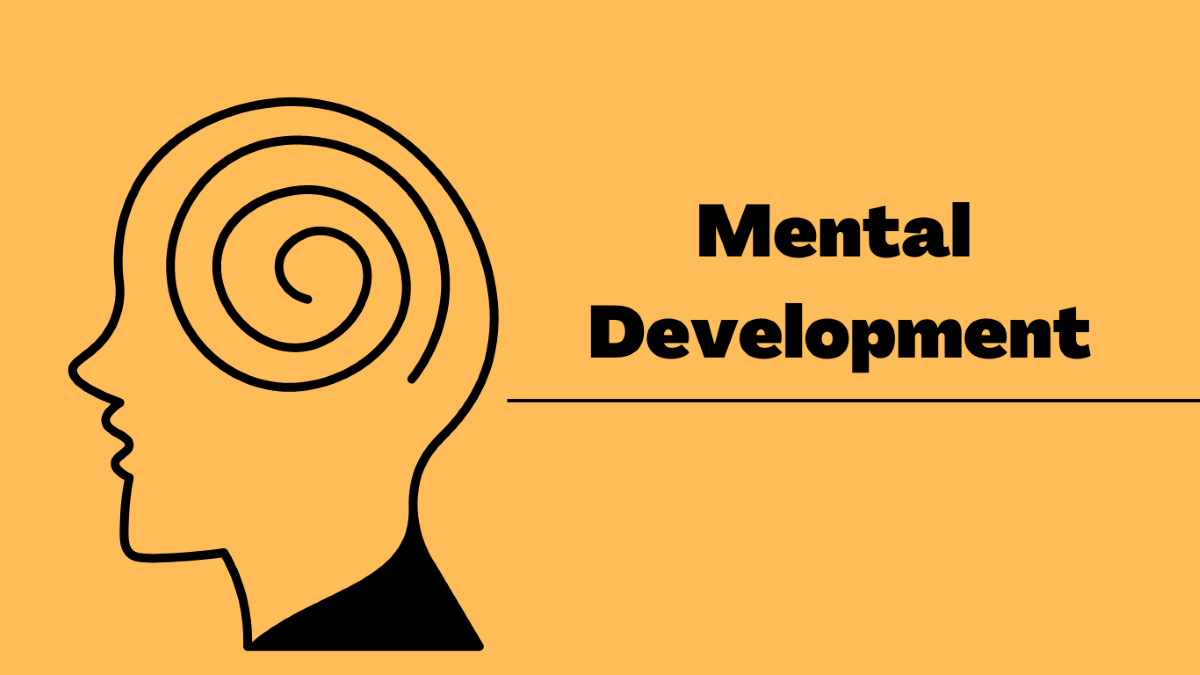
11 thoughts on “4 Best and Effective Ways to Develop Yourself Mentally | Mental Development”